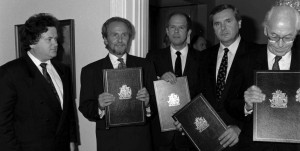
26 August 1991. From left: David Oddsson, Jon Baldvin Hannibalsson, A. Saudargas, Lithuania, J. Jurkans, Latvia, og Lennart Meri, Estonia.
Professor Hannes H. Gissurarson, RNH Academic Director, attends the annual Lennart Meri conference on international affairs in Tallinn in Estonia 24–26 April 2015. Speakers at the conference include Toomas H. Ilves, President of Estonia, Radek Sikorski, former Polish Foreign Minister and now President of the Polish Parliament, Ana de Palacio, former Spanish Foreign Minister, Uffe Ellemann-Jensen, former Danish Foreign Minister, Swedish analyst Anders Aslund and government ministers from the Baltic countries. Some of the scheduled speakers have visited Iceland on the invitation of RNH or related organisations, for example François Heisbourg and Andrei Ilarionov. The theme of the conference is “Limits to Order”, but the main topic is the situation in Russia and its neighbouring states, in Central and Eastern Europe as well as in Ukraine. Professor Gissurarson’s attendance at the conference forms a part of the joint RNH and AECR project on “Europe, Iceland and the Future of Capitalism”. The conference is held in honour of Lennart Meri, who visited Iceland in 1991 as Foreign Minister and was President of Estonia from 1992 to 2001. Friday 24 April, the President of Estonia invites Professor Gissurarson and some other conference attendees to dinner.

Moscow 1957: Icelandic communist leader Einar Olgeirsson (with hat and glasses to the left) with other Nordic communist leaders.
Tuesday 28 April 2015 Professor Gissurarson gives a lecture at the University of Tartu on “Soviet Influences on the Icelandic Communist Movement”. He provides a brief history of the movement, from 1918 when two Icelandic students in Copenhagen entered into contact with a Comintern agent, Fredrik Ström, who gave them money in the spring of 1919. Before the foundation of the Icelandic communist party in 1930, Comintern sent five agents to Iceland to organise the party, and some twenty young Icelanders were trained in revolutionary camps in Moscow, not only in Marxist-Leninist theory, but also in carrying arms, sending and receiving coded messages and falsifying documents. There is only one example of the Socialist Unity Party which replaced the communist party in 1938, not towing the Moscow line: It refused to condemn Titoism. One reason why communists were relatively influential in Icelandic cultural life was that they received generous support from Moscow. In the autumn of 1998, the history of the Icelandic communist movement ended not with a bang, but with a whimper, when the last act of the leadership before dissolving the party was to accept an invitation to visit the Cuban communist party.
 Professor Gissurarson will also touch upon incidents in Iceland relevant to the Baltic countries, such as a 1923 lecture tour on bolshevism undertaken by Latvian Liba Fridland, newspaper articles in 1945–6 by Lithuanian refugee Teodoras Bieliackinas, a 1957 visit by Estonian Premier-in-Exile Dr August Rei, the 1973 translation by then law student David Oddsson of Anders Küng’s book on Soviet oppression in Estonia and the re-recognition by Oddsson’s government in 1991 of the independence of the three Baltic countries. Professor Gissurarson’s lecture forms a part of the joint project by RNH and AECR on “Europe of the Victims: Remembering Communism”.
Professor Gissurarson will also touch upon incidents in Iceland relevant to the Baltic countries, such as a 1923 lecture tour on bolshevism undertaken by Latvian Liba Fridland, newspaper articles in 1945–6 by Lithuanian refugee Teodoras Bieliackinas, a 1957 visit by Estonian Premier-in-Exile Dr August Rei, the 1973 translation by then law student David Oddsson of Anders Küng’s book on Soviet oppression in Estonia and the re-recognition by Oddsson’s government in 1991 of the independence of the three Baltic countries. Professor Gissurarson’s lecture forms a part of the joint project by RNH and AECR on “Europe of the Victims: Remembering Communism”.
Wednesday 29 April, Professor Gissurarson will address a meeting in the Estonian Parliament, organised by Dr Mart Nutt, historian and Member of Parliament. His topic will be similar to that in Tartu University, aspects of the history of the Icelandic communist movement. This lecture also forms a part of the joint project by RNH and AECR on “Europe of the Victims: Remembering Communism”. In Tallinn, Professor Gissurarson meets with prominent Estonians, including former Prime Minister Mart Laar, whom he has known for decades. Thursday 30 April Professor Gissurarson gives a lecture at the Business School of Tallinn 17–18.30 on Piketty’s challenge. He argues that the celebrated French economist Thomas Piketty systemically underestimates the income of the poorest, while overestimating the income of the richest. Statistical errors have, according to Professor Gissurarson, crept into his analysis. Piketty does not seem to have realistic grasp of the fragility of capital: Wealth is the most precarious and unfaithful of friends. What really matters is to have opportunity to better one’s conditions, and this opportunity is created by economic freedom. Piketty should be more interested in the perils of strong government than in the accumulation of wealth. Moreover, nothing is really wrong with an inequal distribution of income provided it is the consequence of free choice, not of coercion. Professor Gissurarson’s lecture forms a part of the joint RNH and AECR project on “Europe, Iceland and the Future of Capitalism”. After his stay in Tallinn, Professor Gissurarson will travel to Helsinki to do research in connection with his current research project for the Icelandic Ministry of Finance, “Foreign Factors in the Icelandic Bank Collapse.”



